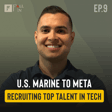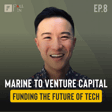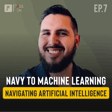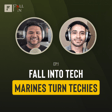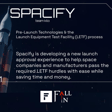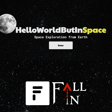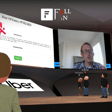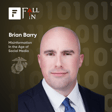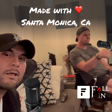Become a Creator today!Start creating today - Share your story with the world!
Start for free
00:00:00
00:00:01

Fall Into Tech #2 - John Kennealy: Army to Software Engineer
In this episode of Fall Into Tech, hosts Jameel Matin and Michael Rodriguez chat with John Kennealy, an Army veteran turned software engineer. John shares his journey from military service to the tech industry, offering valuable insights on:
- Transitioning from the military to a tech career
- Choosing between college and coding bootcamps
- Preparing for tech interviews and job searches
- Overcoming imposter syndrome in a new field
- The pros and cons of working in tech
- Adapting to large codebases and new programming languages
- The importance of soft skills in tech careers
- Perspectives on AI and its impact on the industry
Whether you're a veteran considering a move into tech or already in the field, John's practical advice and candid experiences offer a roadmap for success in the ever-evolving world of technology.
GUEST INFO:
John Kennealy LinkedIn
EPISODE LINKS:
- GI Bill Veteran Benefits
- Western Illinois University
- YouTube (Free Code Camp)
- Pluralsight
- Coursera
- GitHub
- ChatGPT
- Code Platoon
PODCAST INFO:
- Podcast website: https://www.fallintotech.com/
- Youtube
- Apple Podcast
- Spotify
- Zencastr
SOCIAL MEDIA:
HOST INFO:
Transcript
Welcome and Introductions
00:00:00
fall_in
All right, welcome ah everyone to the ah Fall in the Tech podcast ah hosted by Jamil and Michael. We're two Marines turned techies. And um you know this is where we chat with fellow veterans about their journey from the military to technology in order to help you with your tech career.
00:00:21
Michael Rodriguez
Yeah, so ah tune in weekly for guest interviews where we can discuss things like specific tech roles, career paths, and tips for succeeding in tech. And today
Meet John: Army to Software Engineer
00:00:33
Michael Rodriguez
we have our first ever guest, John. So John is ah an army soldier turned software engineer, which is where I met him and work with him up in Chicago. And fun fact about him, he is a huge Yankees fan.
00:00:49
John Kennealy
Nah, okay. See, we're already we're already off the rails. We're barely into this. You're already off the rails. I'm a massive St. Louis Cardinals fan.
00:00:57
Michael Rodriguez
That's fair, that's fair. um But we do like to do a quick little fun segment at the beginning. um We're gonna try to keep doing it going forward where we make the the guests give a fun fact about themselves. So anything you can give us, John?
Military Background and Journey
00:01:11
John Kennealy
ah Yeah fun facts I always like it's fun facts like you do do those icebreakers and like oh it's a fun fact and somebody says something up that wasn't that fun so it's probably what this is gonna be like but I have so as a paratrooper when I was in the army and I have jumped into both the Atlantic and Pacific oceans so it's pretty fun so yeah I don't know how fun it is but it is a fact
00:01:30
Michael Rodriguez
That's pretty cool.
00:01:31
fall_in
That's awesome um That's awesome, so why don't we jump into your military background a little bit could you tell us what branch you served in and um Yeah, why did you join and um how many years you served?
00:01:32
Michael Rodriguez
cool effect.
00:01:35
Michael Rodriguez
Awesome.
00:01:49
John Kennealy
Yeah. Um, so I was in the army. Uh, did ah just under 10 years, uh, about nine, just more than nine and a half, uh, split between active and reserve time. Um, I joined because, uh, I actually, so I actually have always wanted to be in the service. Um, I graduated high school in 02. Don't date me um and but at that time obviously, you know the wars I mean had just kicked off and it was really pumping um and I actually had like had the paperwork at my house to join the Marines like you fellas um Yeah, so I was I mean look So, you know everything aside the Marines I still think do and have always had just the the sharpest dress uniforms like the dress blues and so I was like man they just look good and like I
00:02:19
fall_in
Oh, shit. Something must have happened.
00:02:33
John Kennealy
the They're the real ones. you know No offense to my army peeps. but um But so I had them there to sign. And my mom, my grandma were there just bawling their eyes out. because i was So I was the first one in my family to be accepted or have a chance to go to college. And so they really leaned on the hey, man, go to college type of thing. um And so I eventually did, I said, okay, so I went to college first. So I did it backwards, went to college, got some to student loans, got a degree in political science, ah got out of that, was working kind of just regular jobs and still had that itch, like I still wanted to join. And so as I started getting older, it was kind of a now or never type moment. And so I was like, all right,
00:03:08
John Kennealy
um But then at that time, I switched up again. I was like, you know what? Because my buddy was in the Air Force and he was an air traffic controller and was like, man, it's amazing. I've done this, this and this. And so I was like, all right. So I went to the recruiter and was going to join the Air Force. um And then the lady I was dating at the time was like, no, I don't like that. So it's either me or her. My recruiter instantly goes, dude, you should, you know, it never works out. I was an idiot. I said, nah, this'll work out fast for like three months. It was over. um And so I went back and was like, Hey man, how about that Air Force?
00:03:37
fall_in
Okay.
00:03:39
John Kennealy
He was like, Oh man, now we got like a year wait list. And I was like, ah, Jesus and the army guy was sitting right there and he was like you can go tomorrow if you want to and I was like well Let's pump those brakes, but let's talk more. So that's how I ended up settling with the army um And ended up it worked out though because ah You know you go through your little maps and you get your little like jobs and stuff and and I remember him telling me He was like, oh man, we got this job. That's that opened up. I never see it um again all the probably classic lines um but it was for what's called a watercraft engineer and I was like
00:04:12
John Kennealy
You know, I'm not really a big mechanical guy, but what's that about? He was like, Oh, you like the beach? I was like, who doesn't? He was like, Oh, you like a lot of downtime? Like who does it? He was like, Oh, you should do this.
00:04:19
Michael Rodriguez
you
00:04:19
John Kennealy
And then of course he threw in the, Oh my God, I never see this. It's got an airborne option. and And, uh, anyways, he got me. So I was like, all right. Um, but the reason that worked out is because it turns out the specific MLS I had with that specific airborne option, um, they only put one in each of the like soft groups. So like all the SF groups get one of me, all the range of Italians like get one of me. So like, it was a very, very cool job that allowed me to do some very, very cool stuff. So, um, that was my very long answer to a very three simple questions. Yeah.
00:04:48
fall_in
Well, that's awesome. um And to kind of touch upon to this chapter more, what would you say are like the best parts of your time in the military and worst times?
00:05:00
John Kennealy
Um, so the I think the best thing overall about the military and one of the things that kind of pushed me towards it too is so you know to raj's joking point about the the yankees I have and I still am a massive sports fan i've played Just about every sport.
00:05:13
fall_in
Oh,
Camaraderie and Challenges of Military Life
00:05:14
fall_in
yeah.
00:05:14
John Kennealy
Uh, you can you can imagine in fact, I played college hockey Um, I still play a bunch of like sports where I can't so i've always liked being on a team And so one of the things that you know
00:05:17
fall_in
No, it shouldn't.
00:05:24
John Kennealy
It kind of draws you to the military, right? It's supposed to be all for one, one for all, whatever, that you know the guy next to you, et cetera, et cetera. But that was true. like My time in the military, I mean, I still have friends, like I'm sure you guys do. you know i've I've been out now since 2019. So like but you know it's it's been a been a minute, but I still have people that I talk to ah you know ah frequently. I still visit. you know still still um Interact with so like the the friendships and the camaraderie that you get um Just by being with people all day doing menial tasks most of the time, you know It's nothing like bonding over sweeping the motor pool or doing some stupid stuff like that.
00:05:59
Michael Rodriguez
Let's see.
00:05:59
John Kennealy
So I really liked that the most. ah Now, the other easy thing is kind of what I got stationed and what I was doing, you know, being with those SF guys, you get to do all the cool guys stuff without having to do as much of the cool guy crap. You know, I didn't have to do the stuff that I still got to go training and working with the dive teams. You know, we we would be in places like San Diego, Key West. and And so I definitely got to do some cool guys stuff, but but I think the friendship and the camaraderie is probably still the best.
00:06:25
fall_in
and was
00:06:28
fall_in
Yeah, yeah, absolutely.
00:06:30
Michael Rodriguez
Agreed.
00:06:30
fall_in
um Yeah, I was going to just ask real quick. Well, what would you say are the worst parts of ah the military?
00:06:36
John Kennealy
Well, even that motor pool wasn't great. ah Um, latrines, you know, it's to be honest, you know, there's stuff while you're in it.
00:06:38
fall_in
Yeah.
00:06:43
John Kennealy
We're like, man, do I really want to go on this validation run? It's 10 degrees outside. Nah. Am I really feeling this 70 pounds on my back today? Nah, but like, i just you I don't know. Maybe it's because I went in when I was older. I always just had the mindset of like, hey, I chose this. you know i mean like this is like What did you think it was going to be when you got here? you i mean like It was what I expected, minus some of those menial tasks that um you know stink. But to be honest, you get them in any job. i mean There's not a job I've had where I haven't had some where Somebody's like, hey, I need you to go do this. And you're instantly like, why am I doing it? This is the dumbest thing. This is such a waste of my time. It happens everywhere. It just so happens in the military. It's just like extra kind of you know the hurry up and wait stuff. It's just that type of stuff that you know I don't miss. I also don't miss getting up at 4 o'clock in the morning. But um while I was in it, I didn't hate it. You know what I mean? like
00:07:30
John Kennealy
ah you know
00:07:31
fall_in
No, I feel you.
00:07:33
Michael Rodriguez
Yeah, let's ah I guess now transition to kind of why did you decide you wanted to get out and then why specifically tech.
Transitioning to a Tech Career
00:07:45
John Kennealy
Yeah, so it's funny, when I joined, I thought I was gonna be a lifer. I thought I was gonna do my 20 and retire. That was the plan. It's what I wanted to do. um Unfortunately, the job I had while I loved it was very specific, right? And eventually you promote yourself out or you time yourself out. So I couldn't just stay and do 20 years in that space. So I would have had to have gone back to like the regular kind of where my friends from AIT and what they were doing, which was literally being on ships and being assigned to ships. And it was almost like being in the Navy, but really being the army. And I didn't really want to do that. um Unfortunately, they had a lock on it. So I'm i'm not sure if it's the same in the Marines, but you know, in the army, you have if you don't have enough people, they put a cat, you can't leave, you can't switch out of the MOS. And so that was one of the things that they're like, hey, we were desperate for 88 lemurs. And so we're not letting you reclass. And so I was like, well, then I got to get out because I don't I don't want to do that. And at best, they could offer I think it was like one more year. But then after that,
00:08:41
John Kennealy
maybe needs of the army. if i So I got to a point of, I just couldn't get out of that career field and I couldn't keep doing all the cool guys stuff that I was doing. And um so at that point I was like, okay, well, I need to make a decision. ah I had my political science degree, I had my bachelor's in that. But I knew I didn't want to get into that. And so I knew I would have to make a transition at least out of active duty. That's why I said I did a mix of active reserve. So I wanted to stick around with the army, or at least with the military. But I knew I was going to go back to school. And coming out, all the job forecasts were for either medical stuff or tech stuff. And I was good with the medical stuff, not really my jam. I'm good.
00:09:17
John Kennealy
But the blood guts, whatever, like, I just, it's just not, not exactly what I want to keep getting up for. And then the tech side, I'd always been like a gadget type of guy. So I always liked to read tech articles, even if I didn't really quite understand what was going on, just to kind of be like, Oh man, what's a cool new thing coming out? um If there was a cool new gadget, like I remember it, like this isn't like what I call a cool gadget necessarily, but you know, when the iPad first came out, bought it, ah you know, the laptop bought it. ah um the iPad bought it, like anything that was like a cool gadget. So, so it was always like, Oh, I liked that. And I liked puzzles, you know, I liked solving things. And so the more I kept talking about the more people like that's, that's the right up your alley, then that's what you should like doing, right? Every day is gonna be different. You're constantly gonna be solving some sort of puzzle in terms of how you can take a request and and code it into given good output.
00:10:03
John Kennealy
um And not for nothing primarily to all the jobs in the money where so I I ah decided to do that So I went back to school stay in the reserves and then I went and got my computer science degree
00:10:14
Michael Rodriguez
So, okay, so it sounds like you went to college, got a computer science degree now for, you know, listeners who kind of want to get into tech. Is that the path you would recommend um to go get a computer science degree? Or is there there other resources you think are good or that you used that listeners can kind of use?
00:10:33
John Kennealy
Yeah. Yeah, so it's funny because you know I was actually just giving this piece of advice um to to somebody recently. um So would I recommend college? So yes and no. I'd say it's situationally dependent. And I say that. So I went to college first before I joined the military. So I got my college experience, which I do think is a valuable experience. um If you didn't, like let's say you're somebody who enlisted at 17, 18, you went right in there. Right. Um, if, if you've got the time, because let's say you just did your four year, you know, if you're, if you're under 30, you've got so much time that, um, it might be worth it to, you know, take that GI Bill money, go to college, experience that for your four years. You know what I mean? Like there's no rush to get back out into the world. I promise you, when you go back to college with like military money, when you have money, it's such a different animal. Like when I was in college at first had no money working, really counting quarters to go out and have a beer with the dudes like,
00:11:28
John Kennealy
and then going back and actually having income, it's crazy. so So if you're young enough that you have time, I would say it's worth it. Because you can you can really get into the nitty gritty and it allows you the freedom to figure out um Not just, hey, I'm in tech, but what part of tech maybe interests me the most? you know i mean do ah am i Am I a graphics guy? So am I like, hey, I'm looking to get into video games, and I really want to ah dive into that aspect? um Do I like back-end coding? Do I like front-end coding? The four years gives you enough space that you can really like, oh, maybe I like mobile. like I got to sample a bunch of stuff and figure out what I liked.
00:12:01
John Kennealy
um But if you don't want to, if you're just ready to get into it, or if you're a little older too, like those boot camps they have, those coding boot camps and stuff are fantastic. that So that's what I was just telling my buddy. I was like, you know, cause he was a little bit older and stuff. and And I said, Hey man, but you can take a couple of months and really drill in and they'll give you the the tools and and the knowledge, the stuff that you need and hook you up usually with at least interviews for for different places. And that can just jump you right in there. Because there's no to me, there's no there's no substitute for experience. ah You can take classes. You can learn all you want to and pass the stuff. And that's great. But until you get in there and have hands-on experience, like it's it's just a different animal.
00:12:38
John Kennealy
um I'd also mention, like if you're curious, there's so many there's so much free stuff online too to give your like give it give yourself ah at least in an opening to it, expose yourself to it. You can we can code little small projects. You can try a little tech. You don't even have to wait for stuff. You can just do it now. So if you're in the military listening to this and you're like, oh, I'm kind of interested, you can do that stuff now. um And I would recommend taking advantage of that if you are still in. you know what i mean like Get your tuition assistance. Let them pay for that type of stuff. so um Again, I know it's a very rambling answer to a very simple question, but I do think it's it's a little situation specific, right?
00:13:09
fall_in
Thank
00:13:12
John Kennealy
So it's what's best for you. Because I think, and especially as we've gone, as I've been in tech longer, you know, when i i I went to go get a degree because that was what I thought was necessary.
00:13:14
fall_in
you.
00:13:22
John Kennealy
It was like, oh, you have every job offer, right? Bachelors required, bachelors required, but so many job postings. Now i I see it's, you know, maybe it's preferred or wanted, but it says bachelor's or, you know, X amount of experience or X certifications. Like you can get around it. You don't have to go that route anymore. So, um, I'd say, uh, it's, it's just situation dependent. It's, ah it's on you as a person, what, you know, what you want or what you think you'll be best with.
00:13:45
Michael Rodriguez
Yeah, I agree with all that. um Again, I'm a coding bootcamp guy. um While I was still on active duty, kind of do what you said where there's so many great YouTube videos, YouTube tutorials out there on front end, back end, different languages. So I just started watching some of those, try to pick up you know the basics, see if this is kind of something I'm interested in. So yeah, definitely recommend doing that. and when you said you were in college and you kinda got a taste of the back and front and stuff is that on your personal time you just kinda coding or is these are these actual classes you're taking that they're telling you this stuff and showing you this.
00:14:20
John Kennealy
Uh, it was a little bit of both, but primarily the classes, right? So, um, you know, when you get your, you, you have your kind of requirements, right? So you'll have Keystone classes. You have to take these classes and then you'll have a certain amount of electives. So they can be, you know, any sort of 200, 300, 400 level in anything in that field. So for instance, As an example, I mentioned mobile. So one of the um elective classes I could have taken was mobile development. And so we worked with Swift, and which is Apple's um you know mobile system. And so it was it it was it wasn't required. like I didn't have to take that class, but I i chose to take that class. um And it was fun. it was It was cool. It exposed me to something. And I was like, oh, this is interesting. And there was obviously a lot of market there. and And then that, to your point, I was like, oh, I like this. So on my own time, it got me enthused enough to try to develop a little app on my own.
00:15:07
John Kennealy
um And there were other examples like there was I'm blanking on the Oh cobalt so cobalt's this outdated language that um a lot of I should say a lot but enough businesses still have because this is legacy system So anyways, all the way stays I took that as an elective because my advisor was like hey We're one of the few schools like not every school even offers this language anymore But if you want to take it It's a good line on your resume to have an immediate job because there are a bunch of companies out there that still deal with it and trying to like move on from it. But there's not enough code. Everyone's in Java. Everyone's in C. Everyone's in Python. you know Nobody cares about COBOL. So that was another um like elective that got you know
00:15:46
John Kennealy
something that was fun to see. and I have, I've yet to see it again. No one's ever asked me about it. No one's ever, you know, I've never coded in it again, but, um, so yeah, it was kind of a mix. Um, the, the coursework allows you to dabble and then, um, while you're there too, because again, you're in college, right? So you have lots of free time. There's lots of resources. So, you know, if you just wake up, you're like, I don't know, I'm going to head down to the computer lab or there's other people you can work with. It's just, it's so collaborative. So.
00:16:11
Michael Rodriguez
Awesome.
00:16:12
fall_in
Nice. um I wanted to touch upon when you were getting out, what resources do you think lacked as you're getting out?
00:16:23
John Kennealy
which resources lacked? Well, so ah so I can't speak for every service, obviously, right. So I assume every I assume every branch has a different kind of discharge like process. um I can speak to the army, at least at that time, when I left active duty that was 2014. And so at that time, we did have like classes, so you'd have to go sit and they would talk to you about um your options, right? Do you want to get right back into work do you want to go to school um do you want to start your own business they were big on that too and then they would present you know if you want to go on these three paths you can take this extra class or you can go to this other meeting essentially and then we'll have you know people come in and kind of explain the GI Bill or explain
00:17:03
John Kennealy
um you know the VA like small business loans or you know stuff like that. And so, I mean, it was good. I guess I would say um the thing that it lacked, if you will, is I knew I wanted to go back to school. So of those three apps, I knew, hey, I'm gonna pick the education path. That's what I'm gonna do. And they're like, okay, cool. And they kinda gave generics in terms of you know you might qualify for the Montgomery GI Bill or the post 911 GI Bill and then here's a bunch of like dry kinda like whatever's. There just wasn't as much one on one time like I didn't get the follow up or make an appointment say with an advisor to then be like hey.
00:17:34
John Kennealy
Here's specifically what I'm looking for in my education. Here's what I want to get out of it at the end of it. like you know What are the best schools to go to? Or what are you know where can I get the most bang for my buck? or just Those type of individual stuff. Because it ended up boiling down to, I just ended up saying, well, I'm just going to go back to the school I've already been to. I know it's got what I need. I'm very familiar with it. They they are very pro-military, so I knew they had a very good Veterans Resource Department. And so that's what it ended up with versus you know had I had um a little more info there, maybe I could have made a different decision. um I will also say the bigger thing wasn't necessarily when I left the army, it was when I got to the school.
Leveraging Veterans Resources for Education and Transition
00:18:14
John Kennealy
So if you're thinking about going to a school, you're doing the degree thing, when you get there,
00:18:18
John Kennealy
before you do anything. So when you get out, before you declare for unemployment, before you start filling out even some of your GI Bill, if you don't have to, like talk to one of the veterans resource counselors at that university. Most of them will do it for free, even if you're not there, if you're definitely a student, but even if a prospective student, because they will have all of the info you'll need. They'll have all the knowledge to give you. And as ah a quick example, right? I mentioned unemployment, so I didn't even think about that. I was like, Oh, I have a job and now I'm gonna be a student. Well, when I talked to she was, Hey, by the way, you're a federal employee, so you can claim unemployment in any state. And I was like, Oh, that's cool. and The school I went to was close enough to the border of Iowa and Illinois. She was like, I tell people to declare in Iowa, because they allow you to to claim unemployment while you're still a student. Like some states, you can't do both. And I was like, Oh, okay, cool. So for that first six months or so, like,
00:19:04
John Kennealy
I made more money out than I did in, but that allowed me more freedom to do more educational stuff. So it's little stuff like that. um They give you recommendations about, you know, ah because i I had the option of Montgomery or post 9-11. And they're like, dude, do the Montgomery because it's, you know, you get more of a side. They just go through, again, your individual situations and kind of tailor and give you the best advice. um They're also really good about turning your college your military service into college credit. So you you get credit already for some of that stuff. So anyways, again, very long answer. So you can see a theme. I like to talk. um So my my ah I think it lacks the personal touch, but you have to kind of do that, right? If you're discharging however many soldiers, airmen, Marines and stuff ah throughout.
00:19:45
John Kennealy
um It's hard to get that individual, but that was kind of what I would have liked to have had, which I did end up getting when I and i picked the school. And by the way, the school I picked. So what shout out Western Illinois University, um mainly because they're the Leathernecks and you guys are Marines.
00:19:55
fall_in
nice
00:19:58
John Kennealy
And so they're very proud of that. They're one of the only non-military schools that has that like designation. They can call themselves the Leathernecks. Big military school. So um if you are thinking about going to a school, I would check out Western Illinois University.
00:20:06
fall_in
Nice.
00:20:09
John Kennealy
That constantly ranks very high for their their veteran um services and and stuff like that. so
00:20:15
Michael Rodriguez
When you, uh, when you, I guess we're finishing up school, was there anything lacking specifically trying to get a job in tech or any kind of things you wish were around people to talk to or anything like that?
00:20:15
fall_in
Awesome.
00:20:30
John Kennealy
Yeah, well, so yes, but I would I'm gonna preface it with it was pretty much my own fault. So um if if you think about getting attacked and you guys probably know so one of the what you should be doing and what will give you a leg up is have your own profile much like a artist might have paintings they can show off that have a portfolio of of work they can do. do that ah Do that in tech, right? even Like any any sort of programs you're writing, any sort of apps that you're doing, any sort of anything that you can show prospective employers that you have worked in a certain language or you're capable of producing, whatever. I kind of just took it like, oh, that's what my, so you know, I have my degree and then my school, like that will be enough.
Key Tips for Tech Careers and Job Searches
00:21:10
John Kennealy
And then when I first started, like lots of applications would have, you know, give me a link.
00:21:15
John Kennealy
to your um GitHub account or give me a link to ah a portfolio or a website, something to show anything that you have. And so I kind of ended up having to default on like school projects I did, which were you know relatively basic in the grand scheme of things. right I mean, you don't really get too much into it. There's you know some senior projects I did, but nothing crazy like that. so But again, I say that's on me because I didn't spend more of the time doing that type of stuff that I that i probably should have. um but Other than that, I mean, I, I, oh, I guess I also would have started looking for a job earlier too. I just assumed, you know, so like I said, I, I was one of the first ones that to, I wasn't the first one in my family to go to college. So my family primarily is like blue collar jobs, right? You just, you apply for jobs, right? You don't have a resume. You look through the classifieds or you walk to, it you see it, you you know, a buddy like either hiring at the plant and then you just go apply. and So that had always been kind of my mindset. So as I was in my last semester, I was just like, Oh, I'll, you know, I'll start applying.
00:22:14
John Kennealy
I don't know, about a month out. And then when I started that process, dude, so many people were like, oh, we've already hired. We've already, you know, you should have been applying in in the in the fall and you should have been doing all this other stuff and blah, blah, blah anyways. And then I guess the other regret too is if you can take an internship, if you can afford it, take an internship. They almost always lead the jobs. It's good experience. It's good work experience. um So, ah I guess to answer your question, any of the negatives, it was on my fault really. i i I probably messed myself up, um although it ended up working out, so.
00:22:47
fall_in
Nice.
00:22:48
Michael Rodriguez
Yeah, no, that's awesome.
00:22:50
fall_in
um Thinking back to your, you know, when you first broke into tech, do you have any advice to your younger self? um Maybe ah something that you had wish you had known kind of before you broke into it?
00:23:04
John Kennealy
yeah Yeah, start now. If you have any interest, start now. like start Just start like to what like Rad was saying, get on YouTube, watch some videos. There's a bunch of free sites that let you kind of learn the very basics, start learning phrases, start doing basic programming, basic coding. um Again, i I tell people, like I didn't come into this, being older right now, I think about like my my niece and nephew and and that, like I mean you start coding or at least getting some of it like immediate like very young I didn't do any of that stuff You know the closer you get was you know myspace page you were doing basic HTML that you didn't realize you were doing um So I didn't have any prior experience And so um it was a lot of catching up to do so even in school, right? It was a lot of catch-up because my classmates not only were they younger obviously you' coming straight out of high school But they had been coding on their free time or in high school. They had they had been exposed So, you know, they were yawning in that 100 level class and I was you know, I super focused and trying to catch up. So my advice to myself and to anyone else would be, if you have an interest, it doesn't even just have to be tech. But since we're talking about tech, right like you don't wait. Don't make excuses. Oh, I'll get to that next week, or oh, it's you know it's it's Wednesday. I'll start on Monday. Just start now. Just do anything. Again, go to a website. Just take a look. Do a simple hello world program. And and start just start the sooner you can get those repetitions,
00:24:22
John Kennealy
right you know That 10,000 hour theory right about about improving yourself and being better and trying to be a master at your craft, you just you have to put in the the hours of actually doing it. So ah my advice to myself and and to anyone is if you have an interest, interested if you're thinking about it, just start just start getting into it.
00:24:40
Michael Rodriguez
Yeah, I agree completely. um Again, we kind of mentioned that I'm a coding bootcamp guy. But again, if you just, you know, go to a coding bootcamp and you sit there and listen to what they're teaching you. And then as soon as the day's done, you kind of log off and Well, I think I learned just because I listened to it that you got to really put in the time, coding on your own, building some of these projects on your own, just kind of like John saying, you really just have to put the time in. There's no substitute for time. um And you mentioned, you know, kind of having a bias for action, as I say in the military, um besides something like YouTube, which I know is what I use ah a lot to kind of learn things. Is there any other specific resources you have liked for kind of learning on your own?
00:25:25
John Kennealy
um ah I've used Pluralside a lot. I've used Coursera a lot. um There are a lot of schools, I mean, my mind's gonna go blank now. I probably should have thought about this before, um that offer free, you can do free classes, you know, free, they'll just have it on there so you can go but go by yourselves. I mean, there's there's so many free options out there. Um, and so much stuff, even if you take a trial, right? Like, again, just, just getting, just doing anything, whatever works for you. Cause the other thing is kind of depends on how you learn, right? So I'm a very hands-on learner. So I could sit here. I could listen to you. You could, you could give me the lecture. I could read the book. I could write the notes down.
00:26:03
John Kennealy
But I'm not actually going to comprehend it until I do it myself. So i like i I'm drawn towards the ones where it's like, we'll i'll give you a little bit of um instruction, but then we'll say, OK, now you go do it. And now you have to go code it. Now you have to go you know debug it. you have to You have to go do those things. So for me, from my learning style, the ones that I tend to enjoy and actually get the most out of are the ones that have the most practical applications, the one that have that has the most hands-on type of stuff. so Um, a guy I work with, he's the exact opposite. I mean, this dude, you know, we're taking a, we're, we're focused on AWS at the moment and he's, you know, trying to get a cert. I was, I've been doing all these classes and watching all these videos and doing all these practice stuffs to just read the book and then went and passed it. And I was like, you're a freaking nature. I don't know how you do that. We just read the book and was like, no, I got it. I was like, all right, great. So, um, I guess, you know, whatever works best for you, but it's, it's, it's weird.
00:26:57
Michael Rodriguez
Definitely everyone's different. You just got to kind of experiment, see what works for you um and go from there.
00:27:04
John Kennealy
There's a lot of good, I mean, if you just Google, right, like ah free coding, free software engineering, free, whatever, I mean, you'll, you know, it's the internet,
Day-to-Day Realities of Tech Jobs
00:27:13
John Kennealy
man. You're gonna be inundated with a thousand websites that have, if you're on LinkedIn too, there's always somebody's post about like, hey, here are the free best sites to learn, whatever. And it's, you know, it's there. It's not hard to find.
00:27:25
Michael Rodriguez
And most importantly, listen to the Fall into Tech podcast where we're going to discuss these.
00:27:28
John Kennealy
And yeah, if you, if you listen to this wonderful show, you can't go astray. They guarantee perfect advice and a job.
00:27:38
Michael Rodriguez
No money back guarantees here though.
00:27:42
fall_in
Yeah, we're just added to the cesspool of resources out there. But um so yeah, John, how long have you been in tech and could you talk about your your previous roles?
00:27:54
John Kennealy
Yeah. So I've been doing this, uh, was it six going on seven years? Um, I've only been with two companies. Um, so I don't know if that's a positive or a negative. Uh, I say that cause, uh, I don't, um, however, you know, if you listen, they'll tell you, you know, if you, if you want more money faster, if you want those titles faster, you gotta be looking to move, man.
00:28:03
fall_in
and so You don't job ho a lot.
00:28:15
John Kennealy
You gotta, you gotta, you know, be open to it at least. um And so I i think I'm stuck in the old school, like, nah, man, you get high with the company, you give them your 30 years, they give you a gold wash, and then you bounce out. but' That's how it works. um But anyway, so the two the two companies i I've been with. So one was a private company that did contract work. So I was a full-time employee, but you know we built. So we we did contract work. there We primarily did stuff with SAP, which was crazy, because I had never learned any of that before. I didn't do it in school. I didn't do anything.
00:28:46
John Kennealy
um But I did that for about a year and a half, a little over a year. And then I moved to the very giant financial institution that I work for now, that is where I met Rod, actually, um and have been doing that since since then. um And um it's ah different work. It's more standard software engineering type of work.
00:29:03
fall_in
Thank you.
00:29:05
John Kennealy
um It's been um pretty good, I think. I like the... ah I kind of like the mix of stuff we could do. So it's full stack. So you know, it's not, I don't have, I don't spend my days specialize in one thing, right? Like I'm not just a database guy. So I just do database work all day. You know, I get to, I get to do, you know, SQL stuff. I get to do C sharp. I get to do Java. I get to do business objects. I mean, there's, when I say full stack, I mean, it's a, it's a full stack. And so it's, it's nice being kind of exposed to that type of stuff. I forget. I don't know what was, I'm sorry. What was the actual original question? What were you asking me about?
00:29:40
fall_in
Yeah, no, that was exactly it. How long you've been in, what you answered and kind of um going into, you know, deeper into the roles. But I mean, you kind of touched upon that. but I'm curious if you could touch upon like the day to day stuff. It sounds like you're, you know, moving all ah across the stack here, but um any other two cents around just day to day stuff?
00:30:02
Michael Rodriguez
And what is full stack if you could just you know for people that might be wondering what that means.
00:30:05
John Kennealy
Sure, yeah. So when you say, are you a full stack engineer? So you're talking about back end and front end. So you're kind of doing it all. You're capable and the project usually working on does it all.
00:30:16
fall_in
Bye.
00:30:17
John Kennealy
So you don't just work on say a front end, like a UI that you're you're doing, and in or or just a back end type of, let's say even data stuff, like full stack means you you do it all and you touch it all. And and so that's what we do. So um you talk about day-to-day, right? So I i i work in a ah smaller team. um It's an... It's an okay size project. I'd say maybe about we're up to but maybe around-ish plus people, but we all work in smaller teams. Anywhere from about six to eight is usually preference, some smaller, some bigger. um But ah you know we'll get change requests, right? So the client we work with will say, hey, we want to do this. It might be enhancing something, might be adding something, might be you know taking something away.
00:30:57
John Kennealy
um And then we, as our little smaller teams, then go off and and do everything from start to finish, which is another thing I like too, because it exposes you to a bunch of different stuff, right?
00:31:02
Michael Rodriguez
Thank
00:31:06
John Kennealy
I don't just sit and code all day every day. And I don't just have a boss go, okay, here's, you know, fix this line of code or this this app application is is bugging out.
00:31:12
Michael Rodriguez
you.
00:31:16
John Kennealy
It's clients saying, here's what we want to do.
00:31:17
fall_in
Thank
00:31:18
John Kennealy
Then our team gets together and we say, great. And then we map it out, right? In terms of, okay, what is all needed to deliver this product? How long is it going to take us? How many stories? Because you break up stories. So if you're if you're familiar with an agile method, right so you break things up into smaller and smaller chunks that you can do over generally two-week periods. um So you plan all that out. You roadmap all that out.
00:31:37
fall_in
you.
00:31:39
John Kennealy
And then at the start of said two-week sprints, you you have your capacity, right how much work you as a team can get done. And you take an equivalent amount of stories. And then you do that work. So my day-to-day literally does change almost every day. um In there, especially when in the corporate world, by the way, if you thought formations that you're like, great, I got to listen to the general drone on, just wait until you get into the corporate world. It's the same thing minus standing in formation. You're on Zoom meetings all the time or in-person meetings all the time listening to probably stuff you don't care about um or stuff that doesn't necessarily pertain to you or stuff that you feel like you've covered before.
00:32:12
John Kennealy
um So my my day, usually if I had to pick or i kind of describe ah a typical day, right, I start
00:32:18
Michael Rodriguez
you
00:32:19
John Kennealy
I usually like to get in early so I can leave early. So I like to get in and kind of handle anything that I've been worked that i've been working on. um Then in the morning, we have a stand up so your team gets together and talks about right what you did yesterday, what you're doing today, kind of your progress, et cetera. then i get Then I get to do some actual work before the next interrupted meeting comes in. Then you blink, and then it's lunch. And then after lunch, people are in their little afternoon zone. So you try to do a little bit more work. There's probably another meeting or two in there. And then by the time you look up, you're like, oh, it's time to go home. It's time to take the train.
00:32:49
John Kennealy
and And then you go. So um it's ah it's nice in that not every day is the same.
00:32:53
Michael Rodriguez
Okay.
00:32:56
John Kennealy
ah Every day presents little you know challenges and other stuff you kind of get excited about. um Uh, but then there's, there's also, like I said, the, the meetings just, I don't want to start turning anyone off, but man alive. I was, I'm sure you got like the amount of meetings you have, especially, you know, what's crazy to me is we'll have zoom meetings. We're all in the same building. And I'm like, why am I even, why am I in the office then? Like, what are we doing? Like we could be doing this, but anyways.
00:33:24
Michael Rodriguez
So yeah, you you mentioned a lot of different things there as far as, you know, you have to talk to the client you're building the app for, you have to take what the client says, make stories, they call them, as far as story being what needs to be built, you need to figure out how long that's gonna take, then you actually gotta build it, then you gotta test it, then you gotta send it out, get corrections on it. So it sounds like software engineer, right, is not just coding, I feel like a lot of people think, oh, I wanna be a software engineer, I'm just gonna code,
00:33:49
John Kennealy
Yeah.
00:33:54
Michael Rodriguez
put my head down, but that's not the case sometimes at least.
00:33:57
John Kennealy
No, no, no, no. Yeah. If you're, if your title, if you're applying for jobs as software engineer, um, yeah, you're going to be doing a lot more than just, again, like I think the stereotype is you, you know, you, you put on your headphones, you're listening to your music and you're just tapping away and you're, that's, that's not the case. Uh, you have a lot more responsibility like Rod said, right? You, you, um, Generally have to take requirements and turn them into actionable items. You have to then do those set items. You have to test those set items. You have a release. right So you release your production environment. You have to be a part of that. I mean, it's it's literally end to end. And that's usually why, with your software engineer, in my limited experience, I guess I would say, um you usually are full stack because they want you to be able to do all of those things from start to finish. I mean, its you know when you start segmenting, you start getting very specialized. Well, then you're kind of limited in what you can actually provide to the company.
00:34:45
John Kennealy
um The other thing I would say too, since we're talking about ah stereotypes, I guess, or expectations is like, and I've run into this ah at my current job, we lost some guys because they come out and they think it's just like, you know, they watch the social network and you're just, oh, you're banging away and you're creating all this cool, you know, cutting edge, top of the line, all this, that and the other. Unless you're working for a startup, that's probably not what you're gonna be doing, okay? Like they don't need you to reinvent the wheel. They're very successful for a reason. They have something that works, it's in motion. So really what you're doing, Is making sure that train stays in motion.
00:35:17
John Kennealy
It doesn't break you fix when it does and then every now and then or on the periphery You might be able to do some enhancements i'm not saying they don't ever want you to come up with something new because they're always constantly saying How can we automate this or how can we you know get more for less or how can we revolutionize?
00:35:20
fall_in
Bye.
00:35:33
John Kennealy
Or how can we you know, whatever it is, but that's in my experience. It's such a lower part of the amount of work you'll be doing again unless unless you specifically get on a project that is new right which we have even the bank I work for hey we're getting you know AI is a big thing machine learning is a big thing so we'll have projects they're like we are trying to do something build something from scratch that's when you get to do those type of things otherwise you're primarily taking care of legacy systems and like I said Little enhancement, lots of fixes, bug fixes, and you know just stuff like that. so And I hope I didn't sell that as boring because I don't think it's boring. I said because I had a guy, he joined the team, he thought he was going to be in the social network and was like, well, how come we're not doing that every day? And I go, because you work for it a massive institution that's been around for 100 plus years, they don't need you to do that. So you need to find somewhere else. What they need you to do is keep doing what works and and you know little tweaks here and there. so
00:36:25
John Kennealy
um
00:36:26
Michael Rodriguez
That's a great point.
00:36:26
John Kennealy
ah Be cognizant of that. like Be cognizant of that when you're getting into it. like what what do you want Is that what you want? Because you can find that. um It's much more stressful. So I will say one of the benefits about kind of being the boring, like yeah, I just keep the ball rolling, is again, I come in when I come in, which that's another
Understanding Work Environments and Responsibilities
00:36:41
John Kennealy
benefit. I don't have set hours. I come in when I come in, I leave after my eight hours, and that's it. i don't People don't call me. I don't have emergencies. I don't have, oh, I have to code all night and do all those things. It's not like that. so um you kinda gotta to figure out like what you like what you want to get into in tech, right? Do you want that high-paced world, which also probably means it's gonna pay a little less because they're probably gonna pay you in stock and try to get you into equity, which could turn out great. Like I had those jobs, I had an offer for a startup. um And then when I started realizing like, oh,
00:37:11
John Kennealy
I don't know, this is gonna be a lot.
00:37:12
Michael Rodriguez
you
00:37:12
John Kennealy
I'm gonna have to work 12, 15 hour days, probably five to six days a week.
00:37:15
fall_in
Thank you.
00:37:16
John Kennealy
And that's the hope that my stock that I hope you know ends up doing something with versus what I like, because I like a good work life balance is I do my job, I do it well, I do what they ask for, I give them a little bit more, but then I get to go home after my eight hours. I work my my five days a week, my 40 hours, that's enough.
00:37:33
Michael Rodriguez
That's a great point you made as far as expectations going into a job. um Again, when you're getting interviewed too, you probably want to ask some of these questions as far as like What's day to day look like? What are we kind of working on? All this stuff because like you said, a startup for those that don't know is a smaller company that's just trying to figure out kind of what they're building, build it fast, try to find product market fit versus a company that's been around for 100 years. they're They're well established. They know what they're building. um so Those two are going to be very different ah depending on what you're looking for.
00:38:06
Michael Rodriguez
And, you know, obviously team you're on is larger um with a larger code base. How do you, I guess, as a software engineer handle going into a new role with a large code base, multiple different languages, some of which you've never worked before. Like, how do you approach that and kind of succeed in that and not just crumble under imposter syndrome?
Imposter Syndrome and Collaboration
00:38:28
John Kennealy
Yeah. Well, so listen, I've been doing it ah for a handful of years now. I still have imposter syndrome. So I don't know if that ever goes away. But how do you handle it is something that, you know, is it's kind of a ah goofy old phrase, right? Like, how do you eat an elephant? Like one bite at a time. So if you take it for its totality, it can be very daunting and could maybe have you freeze up. But like, if you're coming from the military, you know, right? You break it down Barney style, right? Break down as much as you can and start somewhere. And then you just start building on it. So it's your point. I came in and there's a bunch of languages I've never learned before. Okay. Let me start with the one I know though. Right. So let me, let me get that repository or that part of our stack that I know. Let me try to get as much of that as I can. Cause you want to be contributive. you You don't want to join a team and just be the guy who, or gal who just sitting around and they're like, Oh, should we, should we let John do it? Nah, he doesn't know anything yet. Yeah. You know, you always have this desire. Like, no, I want to be able to contribute.
00:39:20
John Kennealy
So in that instance, right, find the spot or our the the area that you do have knowledge in and see how quickly you can at least catch up or contribute in that area. And then the other ones, you're gonna have to take some time to yourself, whether that's during your eight hours or outside of it, if you can, and just get in there.
00:39:29
Michael Rodriguez
you
00:39:37
John Kennealy
Just just get in there, right? Like if it's a matter of just, usually there's, most places have development environments or sandbox environments where they encourage you to just try stuff. So just get in there and try some stuff. um I also recommend, again, I said I'm a big team person. I love collaborating. I love pair programming. I absolutely actually do not like programming by myself. I generally don't like going, oh, here's my task. Let me just go off and do it by myself. um It's just not as fun um for me. But also when you work with someone else, especially the beginnings you're talking about, they generally are able to teach you things that you probably wouldn't know else, you know, with even through trial and error, right? Especially somebody who's been there a long time, but they can they can give you. Oh, I know.
00:40:18
John Kennealy
you know let's say you talk about coding standards. Oh, I know you probably learned you know in school or in bootcamp where I'm like, this is how you're supposed to do it. Well, on this project, this is how we do it, or this is how I found this is the easiest way to do it, or this is the best way to do it, or you know here's some shortcuts. like i you know i've I've worked with people who've taught me um great things about how to like debug. like like Here's the strategy I use, and it's way quicker, and it cuts down on the amount of time I'm wasting and stuff like that. So I would say, Start with what you know, at least to get yourself comfortable so that you feel like you're contributing, because that that will fight your imposter syndrome. You at least feel like, hey, I'm doing something. um And they'll give you time, most places to give you time, right? They don't expect you to get hired and all of a sudden be the expert, because if that was the case, you'd have a better title and a bigger bonus. but um So you want to do what you you know, so you have that under there. And then try to get, when you have downtime or you have availability, just start looking into it. Read all the documentation you can, start playing around in those development areas.
00:41:09
John Kennealy
And then not only is it good for your brand and how you get along with the company by befriending people, but befriend people, try to see if they'll help you, try to see if they'll work with you because that will unlock a lot of the stuff that you're looking for about how best to to hand her the job. um And then again, like I said, not for nothing, befriending people, you know, it makes your job easier. um I will also say that you know, interpersonal relationships are just as important in tech as they are anywhere else. I mean, there are frequently people on my team that have questions and I'm like, Oh, I was asked so and so. And they're like, Oh, what? And I'm like, Oh, I, I know this person. I've worked with them. I've befriended them. So if I have a question, I just, it doesn't take me anything to send them a ping or walk over to their desk. And there was like, Oh, I don't really know that person. I go, well, that's a good way to get to start knowing people. Right. So the, the more people, you know, if you just silo yourself, then it becomes just so much more burdensome on you. Then you better be awesome because
00:42:04
John Kennealy
you know if you If you're not willing to work with people, if you're not you know looking to get it, if somebody asks you a question, you better have the answer. You better be able to provide it. so um
00:42:13
Michael Rodriguez
That's great.
00:42:13
John Kennealy
yeah yeah
00:42:14
Michael Rodriguez
Yeah. I remember, uh, when we were working together, um, on the same team, but we had a question and no one on our specific team know how to do it. So we had to like reach out to someone else. And I had to, you know, at first I was pretty new, so I was a little shy of like, uh, do I reach out to this person who's been here for like 15 years? They know way more than me. They're way smarter than me. And, you know, just reached out to them, got on a video call and they kind of walked me through and then. kind of built that relationship up and was able to ask questions later on.
00:42:46
Michael Rodriguez
So definitely don't be scared to ask for advice or help, especially if you're new, because if you are then there for two years and you've never asked anyone for help, and then you two years later ask a super basic question, kind of wonder why it wasn't asked sooner, I think.
00:43:00
John Kennealy
Yeah.
00:43:01
Michael Rodriguez
or
00:43:02
John Kennealy
Well, and you know not only not only that, um you know when you're especially when you're new, people know you're new. So they expect you to ask questions. So you know when when you first start and you go, like people now, if they ask me a question, I mean i generally like to help people anyways. But if I know they're new, like I'm more likely to help them. And I'm more forgiving in terms of, to your point about simple questions. you know Because I'm not going to go, what how do you not know this? it's Well, because I don't know. I just started. ah The only little caveat I would give to that though is because what but bothers me the most and still bothers me is when people ask a question and have done zero of their own, even like research or attempts or anything. They're just like, oh, somebody asked me a question or I was presented with a problem. And I immediately went elsewhere because I usually go, oh, I'm happy to help you. Like, okay, what's your problem? Okay. And what have you done so far? Or like, where are you at so far? If you tell me, oh, I have nothing. I just got this.
00:43:51
John Kennealy
I'm probably very politely going to be like, OK, cool. I will help you, but I need you to go start. And ah you know I know might even be like, start here, here, here, do this, and then come back to me. So don't be afraid to ask questions, but please at least make it seem like you were invested in it at all so it doesn't make it seem like the person you're asking is just doing your job for you. Because that's very quickly how you get people to go, I don't like that guy gal. What? They're lazy. All they do is they they just come ask. They just want you to do your job for you, and then they take the credit for it. So don't be that person.
00:44:18
Michael Rodriguez
g Agreed. That's great advice.
00:44:22
fall_in
um You might have touched upon this, John, but you know to kind of sum things up, what would you say to you are the best and worst parts of of being in tech?
Opportunities and Benefits in Tech Careers
00:44:33
John Kennealy
Um, so the best parts I would say, um, you know, let's just be blunt about it. There's lots of jobs. They're good paying jobs. They probably have good benefits. So from a financial standpoint, it's a great field to be in. Um, so, uh, I do like that. um As I did mention though, um on kind of a personal happiness kind of thing too, I like that every day is different. um Even with setting aside the boring meetings that you don't really like, the the challenges or the tasks for the day or the things you need to get done. you know I've been at this company now.
00:45:05
John Kennealy
for five years. And I really honestly can't say that ah ah any day has been the same. They've all been different. They've all been different. So I like that because ah I have worked lots of jobs that were the exact same. I worked a lot of fast food jobs, like in high school and college and stuff. It's the same thing. It's the same grind and slog over and over again. Tech allows you to not have that. there's there's you know And the nice thing too is um you know there's there's but a thousand different ways to solve a problem. So the three of us could be presented with a problem, be like, all right, go code this. or go figure it out. And the three of us could have all three different answers, but it all works. And sometimes that's okay too. And that's exciting too, because, you know, like I said, pair programming. So if I get something, I'm like, Oh, I think I'm going to, you know, call this method here. I'm going to do this. And then the person worth it. Oh, why don't you do that? And you're like, Oh, well, cause I like this way. or i but And but again, that type of stuff is just very stimulating, very exciting and very, like it keeps you going. So it doesn't feel like, Oh my God, this again, or, you know what I mean?
00:45:57
John Kennealy
um So, ah so i like I like that a lot. um And I do like the freedom to kind of be able to do what you want, right? So um in tech, like I said, whatever little space that you like, and it could change, you know, you could start like I started and I was like, Oh man, I think video is it. I want to get in video games. And then I took a blast. I was like, Oh no, this is boring. I don't like this at all. No, no, thank you. And I was like, Oh, all right. Let me, let me try this Java. All right. Well, that's, that's cool. and I've been getting really into database stuff recently. I just, I don't know. It's something different. I just, I like, but tech allows you to do that type of stuff. Like I said, if you're, you know, if you're a painter, you're you're painting, you know what I mean? That's, that's what you're doing. If you're working at McDonald's flipping burgers, maybe you just flipping burgers. Like there's not a lot of growth. There's a ton of opportunity for growth. I think in the tech sector, again, everything's, there's new things constantly coming along. There's, there's always something new to learn. There's always something new to do. um And then, you know what? If you're, if you're good at it, or if you've got a good idea, man,
00:46:53
John Kennealy
You could turn that into a an app tomorrow or a award-winning podcast and talk to people. And there's just there's just so much opportunity. I don' mean, it seems it seems ah the possibilities are endless until they call you back to the office. And then you have to drive downtown and in an office three days a week. And then you're like, man, I thought this was going to be awesome.
00:47:14
fall_in
Transits, it's a killer.
00:47:15
Michael Rodriguez
that's
00:47:17
John Kennealy
Well, especially
00:47:17
Michael Rodriguez
That's definitely one of those.
00:47:19
John Kennealy
Oh, you know it's sorry, not to cut you off, but it's just especially in you know that the the industry you're working on, unless you're client facing, unless you have to be in front of a client. I'm just the person who's like, I don't see any reason we have to sit in office together, man. We, you know what I mean? Like we could do our work from home. If you want to, like it's the other thing too, I would say, you know, the whole return to office debate. I'm always like, it doesn't have to be a zero sum game. If you want to go in the office, we have office space, man, live your best life. That's where you're most productive or that's what you want to be. Cool. But if you're not also give the people who don't work that way the same, you know, respect and opportunity.
00:47:52
John Kennealy
Or the other thing I would really say is, I just don't like companies putting out blanket policies, um which I get when you get to a certain size is probably what you have to do. But if you let it filter down to team specifics, right? If you start caring more about the outputs instead of every single input, I think you're i think you're better served. So like I said, I work on a team of about six to eight people. you know if If you left it up to us and let us decide how often we need to be together, those teams, it's not like we would never come in. We come in the office sometimes. Sometimes it's it is nice to to get together, be face to face. But you know that would allow us just the more satisfaction to have that. And other teams would be the same, right? when you I will say when you're new, it probably is. You're probably better served being in an office. Like what's crazy. So Rad and I worked together, but it was over COVID. i never I've never met Rad in person, ever. We worked together. I've never physically met you in in in real life. And you know when you started and you're trying to train someone, it is different doing it via, say, Zoom than it is in person.
00:48:47
John Kennealy
ah It's just a different animal. So you know if your team was onboarding someone new or getting a new hire, yeah, you you might be in the office a little bit more until they get a little more comfortable. And then as that changes, then you can you can pull it back a little bit. But again, the impetus is on you and your team. And it cracks me out when you get some of these bigger institutions, right? They talk about like, no, we're empowering. We're self-forming teams. And you get to pick your own work. And they say you this kind of idea of like, no, no, no, it's whatever you want to do until you're like, well, I want to do this. They go, well, we don't do that here. oh Then it then it changes so I yeah that being in office thing is I Know you didn't ask me like what's the negative? That's that to me. It's the biggest negative Of being a tech when you feel like man, I could do my job um Just as good if not better from my house as I can in your office and COVID really shone light on that like I Because I went into any I was with this company before COVID Obviously during and and still after and you know before COVID I went in five days a week and didn't even blink and
00:49:44
John Kennealy
I was like, yeah, what do you mean? Well, of course I would go on five days a week. That's what you do with a job. You go on Monday, Tuesday, Wednesday, Thursday, and Friday and you do your job. And then we were COVID and I was like, wait a minute, I can do this job from my house and be with my dog and my loved ones. And I can take a walk or, you know, put in laundry, do simple stuff around the house and still get my work done. This is incredible. I don't have to ride the Metro or the CTA or any of these other transit systems that stink. It's fantastic.
00:50:07
fall_in
Yeah.
00:50:07
John Kennealy
So then they call this back and now you're like, oh man, I'm gonna go back to the sweet life.
00:50:12
Michael Rodriguez
Riding that Metro in the cold in Chicago was definitely not ideal.
00:50:12
fall_in
yeah
00:50:17
John Kennealy
No, it's like 95 degrees here too. So you get off the train, it's hot. There's a thousand people on the sidewalk. Nobody knows how to walk apparently. And it's just yeahs the the worst part of my day is the tra is the commute for sure. And it's not even the time, it's the people. It's dealing with walking to and from the train station. It's my least favorite.
00:50:31
Michael Rodriguez
And kind of going back, we kind of talked about your roles. Going back a little bit, one thing we didn't really touch on, which I always get questions on is, one, how do you even get interviews for you
Importance of Soft Skills in Interviews
00:50:44
Michael Rodriguez
know some of these companies? And two, how do you prepare for the interview, specifically software engineer from your experience?
00:50:49
John Kennealy
Yeah, so man, so to your first question, like, how do you get these interviews? So I'll be honest, I don't know that I have any. any good tips or anything that you're not gonna hear from anyone before, because generally what they tell you right is to tailor your, whatever you're applying for, like whatever jobs you're applying for. Don't just have one blanket resume. You can and you might get a job, but you you are gonna get noticed, especially now with how AI filters everything. If you generally want to get um even selected in terms of to get them to see your resume without getting filtered out, you're gonna need to hit some of those keywords they have in those listings.
00:51:21
Michael Rodriguez
Thank
00:51:27
John Kennealy
I mean, it can be simple stuff, right?
00:51:29
Michael Rodriguez
you.
00:51:29
John Kennealy
Like, you know, you could say, you know, the terms like agile or, you know, the specific languages, or you just need something because even now I've been in this um for as many years as I have and I've applied to stuff and I've been instant rejected. Just because when I went back and I was like, Oh, wait, man, i it was quick. What happened? Like the resume I c submitted was super standard. It didn't have anything they were looking for. And, you know, that's, it's also what I've heard, uh, friends that have an HR and stuff. They're like, yeah, man, but when I'm looking at it, we've probably already filtered down, you know, we might have a thousand applicants. I'm only gonna get maybe 300 of them because we have a filter we put on if they don't hit these certain things, right? If they don't at least have X, then we'll we'll get them out. So unfortunately, I don't have good like how to like where to apply or how to get that stuff, except to say, if you are a veteran, which is why I assume we're listening to this, um there are a ton of veteran specific type recruiters or people out there, they're looking to companies are looking to hire veterans, they get tax breaks for it, they get to fulfill their philanthropic kind of
00:52:27
John Kennealy
It's like they're looking for veterans and not for nothing. There's a good reason for two besides the financial benefits is you do bring something specific to the table that they're looking for. You're probably a good worker. You're probably very disciplined. You're probably a go-getter. You're probably motivated to do things. You're probably a problem solver already. Like you have a lot of the skills that do transfer into into this stuff. So tout that veteran status. um Look for veteran specific type of stuff. um To help you out and to get you in that network with your people That was the other thing I was saying about like the reason I still talk to a lot of people is we're friends But then everyone kind of disperses and they go all over the country and sometimes the world They have all different kind of connections regardless of what your resume look like Inevitably, it also boils down to who you know lean on those people that you do know Hey, man, like now like hey, ah you know, you got anything going or you heard anything? Oh, maybe I don't but I know somebody who is and it's just all that stuff that that never goes away regardless of what industry and
00:53:16
John Kennealy
If you do get lucky and you do get an interview, how best to prepare for it? So I would say there are two phases. So this is going to sound a little braggy, maybe a little douchey. Every interview I've gotten to, I've been offered the job. So if I get face to face with somebody, I've been offered every job. Primarily, especially since we're talking about tech, it's show off your soft skills. Too often, the stereotype of the software engineer or the coder is the shy, quiet intro nerd who doesn't make eye contact, doesn't speak, doesn't, you know, kind of very blah, blah, blah. Now, you guys are in tech. I don't think that's, you know, that's not everybody. there's There's people like that. But to stand out,
00:53:55
John Kennealy
Be the opposite, be those, be gregarious, be conversational, be you know make eye contact, especially now, the kids these days and kids these days, but people don't make eye contact. But do those things. I say that, and I'll give you a small example. So I applied at this company, um got an interview, had the first kind of interview, thought it went well, then like, all right, we're gonna bring you back and we're gonna do more of a tech interview. So we're gonna it was a phone call, but we're gonna have are some of our technical people on, and we're just gonna have a conversation. They're gonna ask them questions, they're like, great. So we did that. It was the worst thing I've ever been a part of. Um, for some reason, my mind went completely blank. Uh, so much so that one of the tech guys was like, Hey, have you ever read this book? And it was basically like computer engineering for dummies. It wasn't that, but it was something like that. And I was like, Oh no. And he was like, well, you should, it'll help you for future interviews. Give me, I go, Oh great. So this was a disaster.
00:54:41
John Kennealy
So I hang up, I thought I was going to cry. ah Fast forward two days, I get a call back, they're like, hey, we want to make you an offer. And I said, for this job? And he said, yeah. And I said, I got to ask you, that was the single worst thing I've ever been a part of. And he go, yeah, that wasn't great. And I go, so I don't understand why you're calling me with this job offer. And the exact words were, well, look, the technical stuff, I know you still have, right? You obviously have your degree. We've seen some of the work you've done in terms of like the projects I shared with them. um And sometimes it happens, people get nervous, whatever. He goes, but your soft skills are what we're looking for. Could you, do we want to work with you? Could you fit in with our other employees? Do we think you have an aptitude to learn? Do we think you're okay taking criticism? Can you handle something like that and still you know come back? um The tech stuff we can teach you, we can give you those skills or enhance upon the skills you already have.
00:55:27
John Kennealy
but it's the soft skills that that tend to stand out. And you think about, if you were hiring somebody, if you were conducting an interview now, right, one of the things you're looking for is, okay, I mean, can this person actually do the job? But more specifically, do I want them to do the job? Do I wanna work with this person? Do I wanna sit next to this person in a cubicle or jump on a Zoom and see their face every day or every, like, do I want to interact with this person? And I, i in my personal experience, I think that outweighs so much more of the technical stuff. Now you wanna get it, don't get me wrong, Don't come in unprepared. um If you're doing good, your job right look what your role requires so you can try to learn as much as you can about those languages or or that part of the tech stack, especially if you don't know that, or if there's some part that's lacking. um They're more than likely, if you're going to hit a technical interview, they're going to give you a problem. You're either going to do it online, like I've done, or in person, where they just say, hey, here's the issue. Can you sketch it out for us? um My advice for that is, if you know it, awesome. If you don't, never be afraid to say you don't know something.
00:56:23
John Kennealy
It's one of the the bigger things i've i've I've done and been told helps out a lot is they'd rather have someone who admits when they don't know something and is willing to ask for help or go find it versus someone who's super confident, writes on the wrong thing, or or goes whatever, right? Again, who do you want to work with? Do I want to work with that guy who's a know-it-all and who is wrong? Or do I want to work with somebody who's comfortable enough saying like, oh, I don't know that, but I think. um Could be this right? Sometimes you're looking for pseudo code or a lot of times as you can already tell if you've listened this far I like to talk a lot. So when I get into those situations, I talk my thoughts out loud Okay, so this is what you've asked me So I think what you're really trying to go for or what you want is this so I would probably start by seeing if I could design this Maybe I throw this now I'm just walking them through talking them through the entire way So if you're lucky to do it in person, definitely do that
00:57:10
John Kennealy
um because I've had HR people tell me that's what they're looking for. They're not looking good for the answer. They're looking for your train of thought. How did you get there? How did you navigate that? That's what we want to see. um If you're doing it online, unfortunately, that's probably less, although I've done one online and they recorded me and I did the exact same thing, even as I'm tired i'm i'm talking out loud. Maybe they watched it, maybe they didn't, I don't know. um But so those would be my my two recommendations on how to get an interview, which again, I'm sorry, I don't have like a cool silver bullet for it, um but then what to do when you do get that interview.
00:57:38
fall_in
Awesome.
AI in Tech: Opportunities and Integration
00:57:39
fall_in
Yeah, I think as we wrap up here, you know I think this has been so pleasurable just listening to all this advice and just hearing your your raw story here, John. I would be remiss if I didn't touch upon AI. It seems like, you know, I just heard this morning, Ilya, I can't pronounce his last name very well, but he's, you know, part of open AI and things like that. He just started a new startup um um around AI safety.
00:58:04
John Kennealy
you
00:58:07
fall_in
I believe I got to read more into it, but it seems pretty cool. You know, in your opinion, what do you think of AI and and how do you think it'll affect tech jobs?
00:58:19
John Kennealy
Um, I mean, I guess I would say overall, I mean, I'm pro. I mean, I think it's, it's, it can be a helpful tool. I mean, I think now what most people, most consumers, like kind of what you see are just these large language model stuff, right? So you give them a prompt and it gives you an answer back, right? So you say, I don't know, you know, Hey, tell me a joke and it tells you a joke or Hey, how do I write? Here's a good tip for you too. Cause I will say, and I've used this, um, don't be scared to use it to help write cool prompts for your resume or for a job offers and stuff. Hey, you know, chatgbt write me a professional um summary for a software engineer in the field for this like and it'll it'll give you some stuff so that those language model type stuff I mean that's cool it's fine it's whatever um some of the other stuff it's capable of doing I'm ah i'm a big fan of
00:59:03
John Kennealy
um because I do think it can help. I'm not worried about it taking my job. I'm not worried about it taking most tech jobs. To me, I look at it like most tech advances or revolutions, right? So when they're like, oh, we introduced the ATM. This is ah maybe a weird example, but oh, it's going to put all of the tellers out of business. And it didn't. It put some stuff out of business. But you know where one job goes, another one pops up. So now you have ATM repair people. Now you have ATM you know people designing the code that works in the ATM. There's always something there. so Um, maybe ah a clumsy way of saying like, all right, if AI is going to take some part of a tech job, there's still other parts of tech that you'll still have to do. Now you just have to do AI stuff, right? So you'll have to and either incorporate it or maintain it or there's, there's just, there's more to it. I just don't think we're anywhere near ready to just eliminate all of the human
00:59:48
John Kennealy
engineers out there or all of this stuff. i don't I don't worry about it. I don't worry about it from a tech. The only thing I worry about is is making sure that the right people, what worries me is the people who you know disruptors, who want to break stuff, move fast, then screw it up for everybody and and the dangers that it could have and some of the inherent biases and and just some of that that type of stuff. I'm not worried about Skynet. I'm just worried about it being built in to say like our banking stuff and making decisions you know inequitably and just social stuff like that. but I think it's fun bringing on. I don't have nearly as much experience with it as as a you know maybe i I probably should start. but
01:00:25
Michael Rodriguez
No, that's awesome. Yeah, I agree that you need to embrace AI and you need to learn to leverage it in your favor. I'd say kind of how you mentioned with helping you write resume or whatever. Maybe because
Final Advice and Closing Remarks
01:00:42
Michael Rodriguez
you know, only keep getting better, right?
01:00:44
John Kennealy
Yeah, I mean, you know, it's not like anything. else I mean, think about, you know, the, I don't know, the stuff we already use with it, right? You already have digital assistants that you use for other things. you said It's just another tool. i I just look at it like it's another tool in the bell, right? If you're in tech, I mean, if you're in any sphere, but, you know, if you're in tech, right, you have so many tools and in your bell, right? They can be programming languages. So I know these languages. So that's a tool. um I've worked in this methodology, whether it's waterfall or agile. okay I have that tool. i've I've done some business analyst stuff, so I know how to get you know take requirements and turn them into, ah okay, I have that tool. like It's just another one now, okay, machine learning. Okay, I have either experience in using it, I have experience developing it, or I have experience you know fixing it or or whatever. like Okay, that's just another tool.
01:01:24
Michael Rodriguez
Agreed. Yeah, okay. So we've been going for about an hour now and I just really want to thank you, John. um I didn't say your last name earlier. It's John Keneally. We're going to put your LinkedIn in the description in case anyone wants to reach out for you and kind of get some more advice or touch on anything you ah talked about. But I think you gave some great advice here that, you know, other veterans or anyone in tech can can use to either break into tech or you know, succeed in tech. So we really appreciate you being our first guest.
01:01:56
John Kennealy
Yeah, man. I'm happy to do it. um Yeah, I will say, you know, vet or not, feel free to reach out. I, you know, I'll be as helpful as I can. Like I said, whether that's answering questions, you know, hooking up with other contexts I might have, like I'm, I'm, I'm always down to help people. I just think, you know, a rising tide lifts all ships. So I'm definitely down for that. If you are a veteran specifically though, too, um you know, I was president of that's club when I went back to school. i I, I really, really do try to help veterans as much as I can. um And again, a lot of that, whether it's just answering questions, but trying to turn you on to, again, technical specific recruiters or programs or stuff that can that can help you out. um Or it could just be as simple as, you know, again, I worked for a very large institution. They're constantly hiring tons of people. And if that's a matter of reaching out to a hiring manager and being like, hey, take a look at this guy or gal and let me know. So anything I can do. So but by all means, feel free to reach out. And thanks for having me on. This was fun. And as you can see, we keep going for another hour to keep talking.
01:02:48
fall_in
Yeah, absolutely. I think this has been super awesome. um And I think as we close up here, we get to kind of, um you know, share how people can reach us. I think the best way is if we honestly, if we just type in fall in vets on Google, you'll see like our YouTube or Instagram, um LinkedIn, TikTok, all that sort of stuff. But ah that's where folks can find us. And well, like any resources out there, but Yeah, that's ah this is pretty much the pause.
01:03:22
fall_in
Thank you guys for listening.
01:03:23
Michael Rodriguez
Thanks again, John.
01:03:24
fall_in
All right.
01:03:25
John Kennealy
Yeah, thanks guys.
01:03:25
Michael Rodriguez
See you.

